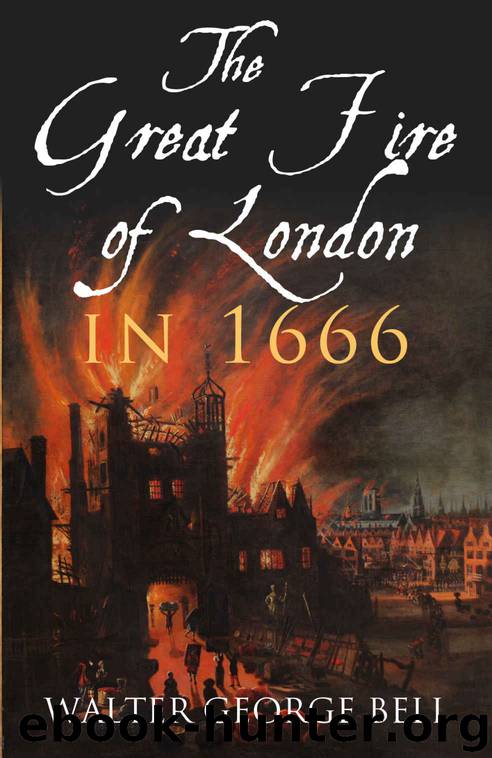The Great Fire of London in 1666 by Walter George Bell

Author:Walter George Bell [Bell, Walter George]
Language: eng
Format: mobi
Publisher: Albion Press
Published: 2016-04-14T04:00:00+00:00
CHAPTER XI — OUTCRY AGAINST THE CATHOLICS
THE King was greatly perturbed by the popular agitation which sought to throw responsibility for the Fire of London upon the Catholics. The Dutch war had brought him no credit. With the nation’s finances in confusion, the capital lying in ashes, and large sections of his subjects gravely discontented by his own religious measures, he realized that neither the State nor the Monarchy had anything to gain from a recrudescence of violent religious strife, but much evil to fear.
In his words addressed to the homeless people camped in Moorfields, he sought to convince them that no conspiracy, whether by Frenchmen, Dutchmen or Catholics, had part in bringing upon them so much misery. All the King’s energies at this time were directed to allaying the popular excitement. He sent for Sir John Kelyng, the Lord Chief Justice, to come to London and take charge of the examinations of witnesses that were at once begun, with a view to ascertaining whether the firing of the City could be attributed to any persons or faction.
On Friday night Monck, Duke of Albemarle, reached London, having left the Fleet, the command of which he had assumed in hourly expectation of an action with the Dutch; and John Rushworth saw the Lord-General next morning, “riding through the rubbish in Fleet Street.” He, too, had been sent for by the King, who was anxious at this time to have about him the one man in whom, above all others, public confidence was placed. Charles was consciously uneasy lest the most powerful agent in his Restoration should take his recall amiss. Lord Arlington’s letter of the 4th September directing Sir Thomas Clifford to place the Royal wishes before Monck is phrased with the most exquisite care —
I leave you to judge what a distraction this misfortune puts us to, whereof the consequences are yet more terrible to us, by the disorders that are likely to follow … If my Lord-General could see the condition we are in, I am confident, and so is everybody else, he would think it more honour to be called to this occasion than to be stayed in the fleet, where it is possible he may not have an opportunity of fighting the enemy; but here it is certain he will have it in his hands to give the King his kingdoms a second time, and the world see therein the value the King makes of him. If his Grace admits you to discourse the point with him, you must take pains to enforce it all you can, but still with this reserve and conclusion, that his Majesty leaves him to make his choice himself . [236]
The Fire had burnt the Post House, and no mails were sent out from London for several days. But quicker than the delayed letters the news of the burning of London spread throughout the country, creating general alarm. [237] From West Cowes one John Lysle wrote to Williamson, the editor of the
Download
This site does not store any files on its server. We only index and link to content provided by other sites. Please contact the content providers to delete copyright contents if any and email us, we'll remove relevant links or contents immediately.
| Africa | Americas |
| Arctic & Antarctica | Asia |
| Australia & Oceania | Europe |
| Middle East | Russia |
| United States | World |
| Ancient Civilizations | Military |
| Historical Study & Educational Resources |
Room 212 by Kate Stewart(5105)
The Crown by Robert Lacey(4806)
Endurance: Shackleton's Incredible Voyage by Alfred Lansing(4769)
The Iron Duke by The Iron Duke(4349)
The Rape of Nanking by Iris Chang(4203)
Joan of Arc by Mary Gordon(4100)
Killing England by Bill O'Reilly(3995)
Say Nothing by Patrick Radden Keefe(3975)
I'll Give You the Sun by Jandy Nelson(3428)
Shadow of Night by Deborah Harkness(3358)
Hitler's Monsters by Eric Kurlander(3328)
Mary, Queen of Scots, and the Murder of Lord Darnley by Alison Weir(3200)
Blood and Sand by Alex Von Tunzelmann(3194)
Eleanor & Park by Rainbow Rowell(3151)
Darkest Hour by Anthony McCarten(3119)
Margaret Thatcher: The Autobiography by Thatcher Margaret(3079)
Book of Life by Deborah Harkness(2930)
Red Famine: Stalin's War on Ukraine by Anne Applebaum(2928)
The One Memory of Flora Banks by Emily Barr(2857)
